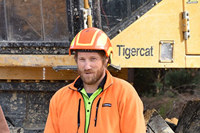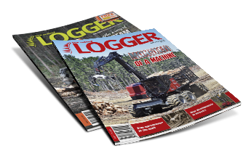 Leading the charge to get Nelson’s windthrow out of the forest on this crisp frosty morning is Burson Logging’s new Tigercat L822E feller buncher with Tigercat’s own 5185 fixed felling head.
Leading the charge to get Nelson’s windthrow out of the forest on this crisp frosty morning is Burson Logging’s new Tigercat L822E feller buncher with Tigercat’s own 5185 fixed felling head.Burson Logging has two of its three crews working in this block and while the race is on to get wind-damaged wood to mills and ports before sapstain arrives, there is time and the temperature on our side to keep that operation in the black.
Crew Foreman for Burson Logging One is Ryan Nichols and he signs us in and goes through the felling plan with our Iron Tester, Brendan (Brendo) Harman, who works nearby running a fixed head harvester.
Foreman, Ryan, got invited to his first forestry job by a mate doing silviculture and stuck at that for five or six years: “I enjoyed the good physical work of thinning and planting and a bit of pruning. Good work for young fellas.”
His first day at work in harvesting was unhooking for the hauler and driving the Bell UltraLogger at nearby Green Hill and then he went further South to log around Dunedin for six years before returning home. Along with his Foreman role, Ryan does fill-in jobs operating diggers and processors when staff are away.
We catch up with Burson Logging’s Ian Burson for a bit of background on how this company started out.
“It’s one of those stories where there’s a bit of good luck and a bit of hard luck and a bit of thinking outside the square,” Ian says.
“We are three generations in now, with the company starting out with Dad, me being trained up perhaps a tad younger than some would like, and now my son has started with us as well.”
Some deep history
Ian’s dad, Neil Burson and his brother started out logging and forest roading back in 1977 when they bought out Nigel Bryant’s dad, Bill’s business in Nelson.
“We count Nigel as a very close family friend even though there is fairly fierce competition amongst contractors at times, but that’s all good. So Burson Logging harvested Beech for export chip, Rimu saw logs and Radiata for Nelson Pine until about 1989 when native logging was banned. Nelson used to have one of the biggest chip yards in the Southern Hemisphere for a while. As a kid it was pretty impressive seeing the big old 155s pushing chips up into the hopper to load the boats,” says Ian.
“Then we invested in a hauler for Nelson Pine which was the first Bellis hauler that Brightwater Engineers ever built, so we bought Number One and we currently own Number 50 and I have said if they ever make Number 100 we would honour them by buying that one, but I don’t envisage them building anymore. I think they got to 78 in total.”
Ian actually worked for Brightwaters for a year when he was 15 and they would always pick his brains about what his dad thought about their hauler and what it needed, and the next one that rolled off the...





